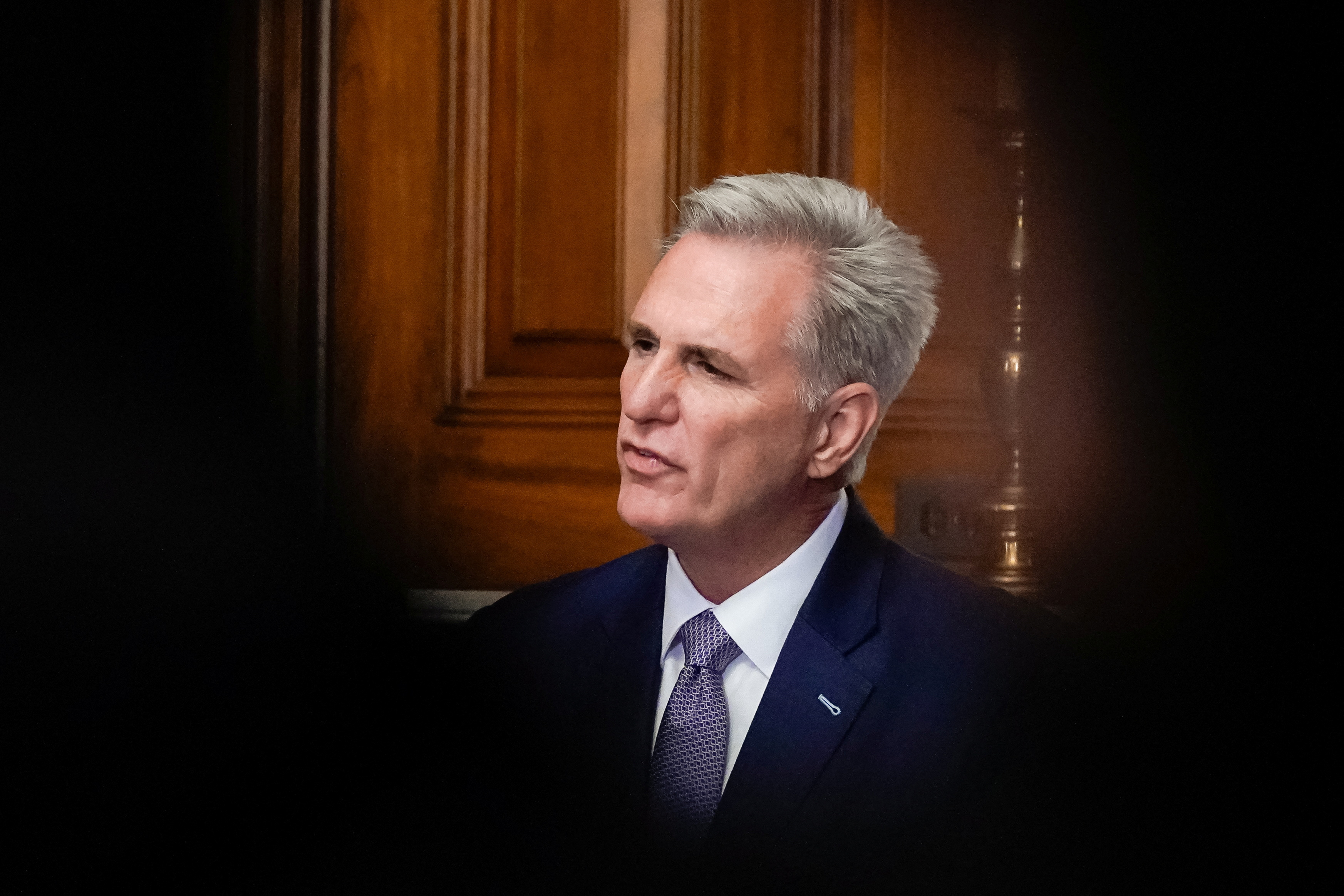House Speaker Kevin McCarthy could face an untimely end to his role as speaker after a hardline critic within his own party on Sunday called for a vote to oust him following the passage of a stopgap funding bill that drew more support from Democrats than Republicans. Hardline Republican Representative Matt Gaetz told CNN on Sunday he would file a “motion to vacate,” a call for a vote to remove McCarthy as speaker. “If at this time next week Kevin McCarthy is still speaker of the House, it will be because Democrats bailed him out,” Gaetz said in an interview on ABC. “I am relentless and I will continue to pursue this objective.”
The Associated Press has the story:
Speaker McCarthy faces ouster threat for avoiding shutdown
Newslooks- WASHINGTON, (AP)
House Speaker Kevin McCarthy could face an untimely end to his role as speaker after a hardline critic within his own party on Sunday called for a vote to oust him following the passage of a stopgap funding bill that drew more support from Democrats than Republicans.
The Republican-controlled House of Representatives voted 335-91 to adopt a 45-day stopgap measure hours before funding for federal agencies was set to expire. The Democratic-led Senate later approved the same bill with bipartisan support and sent it to President Joe Biden to sign into law.

Hardline Republican Representative Matt Gaetz told CNN on Sunday he would file a “motion to vacate,” a call for a vote to remove McCarthy as speaker.
“If at this time next week Kevin McCarthy is still speaker of the House, it will be because Democrats bailed him out,” Gaetz said in an interview on ABC. “I am relentless and I will continue to pursue this objective.”
McCarthy endured a brutal 15 rounds of voting in January before being elected as speaker, during which he agreed to multiple concessions increasing the power of Republican hardliners.
One was the decision to allow just one member to put forward a motion to vacate, which meant that hardliners could threaten McCarthy’s speakership at any time.
Shortly after the House passed a bill late on Saturday averting a partial government shutdown, hardline Republican conservatives began targeting McCarthy’s role as speaker, saying he had scored a victory for the “Uniparty” of Washington.
“Should he remain Speaker of the House?” Republican Representative Andy Biggs, a leading hardliner, asked on the social platform X, formerly known as Twitter.
‘GO AHEAD AND TRY’
McCarthy decided to bring a vote on a measure that could win Democratic support, knowing full well that it could jeopardize his job. One of his advisers told Reuters the speaker believed some hardliners would try to oust him under any circumstances.
“Go ahead and try,” McCarthy said in comments directed at his opponents on Saturday. “You know what? If I have to risk my job for standing up for the American public, I will do that.”
The bipartisan measure succeeded a day after Biggs and 20 other hardliners blocked a Republican stopgap bill that contained sharp spending cuts and immigration and border restrictions, all of which hardliners favor.

The bill’s failure ended Republican hopes of moving a conservative measure and opened the door to the bipartisan measure that was backed by 209 House Democrats and 126 Republicans. Ninety Republicans opposed the stopgap.
Hardliners complained that the measure, known as a continuing resolution, or CR, left in place policies favored by Democrats including Biden, Senate Majority Leader Chuck Schumer and former House Speaker Nancy Pelosi.
“Kevin McCarthy put a CR on the Floor that got 209 Democrat votes, since it kept in place the Biden-Pelosi-Schumer policies that are destroying the country and the spending levels that are bankrupting us,” hardline Representative Bob Good said on X.
DEMOCRATIC RESPONSE UNCLEAR
It was not clear what action Democrats might take if a Republican moved to vacate the chair and the House voted on the measure.
Republican Representative Brian Fitzpatrick, who co-chairs the bipartisan Problem Solvers’ Caucus, said bipartisanship itself would be the real issue in any vote on McCarthy’s future.
“The motion to vacate will come … and the question will be: are we going to punish or reward leaders who put two-party solutions on the floor? That is squarely the question,” Fitzpatrick told reporters.

Some Democrats have suggested they could support McCarthy if an ouster attempt occurred at a turbulent time. Others have suggested they could back a moderate Republican willing to share the gavel with them and allow power sharing within House committees. Others have shown no interest in helping any speaker candidate aside from House Democratic leader Hakeem Jeffries.
“That’s his problem,” Democratic Representative Jim McGovern said of McCarthy. “I vote for Hakeem Jeffries for speaker.”
“People have asked about making a deal with them. But I’m not a cheap date. I’m an expensive date.”
The motion was first used in 1910, when then-Republican Speaker Joseph Cannon put forward the motion himself to force detractors in his own party to make a decision on whether they supported him or not, according to the House Archives. The motion failed.
Then-Republican Speaker Newt Gingrich was threatened with a motion to vacate in 1997. Although he managed to tamp down resistance and avoid an actual resolution being filed, he resigned in 1998 after disappointing results in the midterm elections that year.
Republican then-Representative Mark Meadows in 2015 filed a motion to vacate against Republican Speaker John Boehner. It did not come to a vote but Boehner resigned anyway a few months later, citing the challenges of managing a growing hardline conservative faction of his party.







